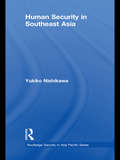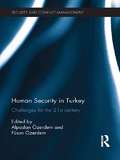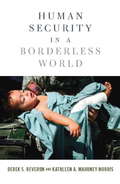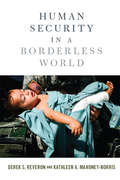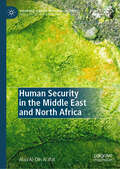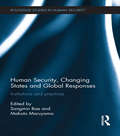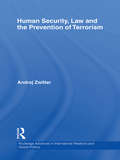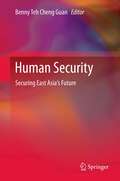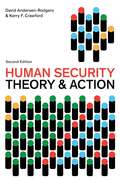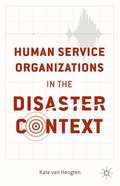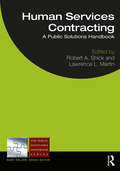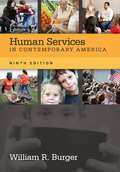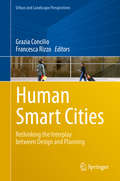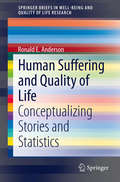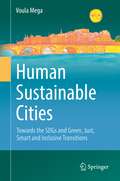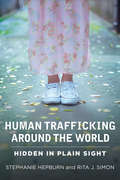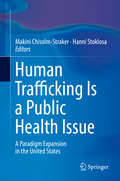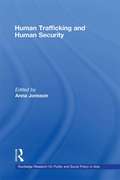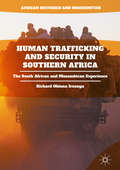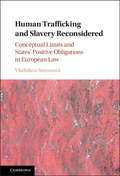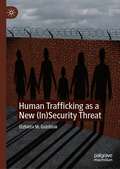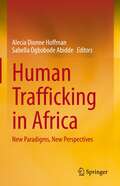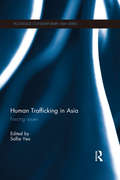- Table View
- List View
Human Security in Southeast Asia (Routledge Security in Asia Pacific Series)
by Yukiko NishikawaThere is a growing interest in human security in Southeast Asia. This book firstly explores the theoretical and conceptual basis of human security, before focusing on the region itself. It shows how human security has been taken up as a central part of security policy in individual states in Southeast Asia, as well as in the regional security policy within the Association of Southeast Asian Nations (ASEAN). The book discusses domestic challenges for human security including the insurgencies in southern Thailand, the Philippines and Indonesia. Transnational security issues such as terrorism, drugs, human trafficking and the situation in Burma are explored by the author, and the ‘ASEAN’ way of contrasting the values and approaches of Southeast Asian countries with those in the West is assessed. By focusing on the ongoing changes and efforts to achieve human security in Southeast Asia, this book contributes to theoretical debates on human security as well as regional studies on Southeast Asia.
Human Security in Turkey: Challenges for the 21st century (Routledge Studies in Security and Conflict Management)
by Alpaslan Özerdem Füsun ÖzerdemThis edited volume explores human security challenges in the context of Turkey. Turkey occupies a critical geopolitical position between Europe, the Middle East and the Caucasus. It is an important peace-broker in regional conflicts and a leading country in peacekeeping operations, and has been a generous donor for disaster response around the world. However, Turkey is also facing a number of fundamental sociocultural and development challenges and its internal stability is affected by a protracted armed conflict based on Kurdish separatism. In other words, Turkey is at a crossroads in its transformation from a state-centred security perspective to one based on human security. To explore selected human security challenges within a wider context of peace and development, this volume focuses on a number of key issues in relation to democratization and social cohesion, before going on to investigate the role of Turkey as an agent of peace in the international context. Written by academics from the fields of peace studies, international relations, politics and development studies, the discussions examine and highlight the issues that Turkey must overcome if it is to successfully strengthen its human security trajectories in the near future. This book will be of much interest to students of human security, Turkish politics, conflict management, peace studies and IR in general.
Human Security in a Borderless World
by Derek S. Reveron Kathleen A. Mahoney-NorrisThis slim volume on contemporary security studies presents an analysis of US post Cold War strategies and attempts to express a comprehensive plan for international security in the twenty first century. Topics discussed include civic security, economics, environmental security, health and cyber security as well as strategies for protecting human security generally in a globalized threat environment. The work includes numerous maps, tables, sidebars and illustrations. The authors are professors of national security affairs at US military service colleges. Annotation ©2011 Book News, Inc. , Portland, OR (booknews. com)
Human Security in a Borderless World
by Derek S. Reveron Kathleen A. Mahoney-NorrisTo fully understand contemporary security studies, we must move beyond the traditional focus on major national powers and big wars. Modern threats to security include issues such as globalization, climate change, pandemic diseases, endemic poverty, weak and failing states, transnational narcotics trafficking, piracy, and vulnerable information systems. Human Security in a Borderless World offers a fresh, detailed examination of these challenges that threaten human beings, their societies, and their governments today. Authors Derek S. Reveron and Kathleen A. Mahoney-Norris provide a thought-provoking exploration of civic, economic, environmental, maritime, health, and cyber security issues in this era of globalization, including thorough consideration of the policy implications for the United States. They argue that human security is now national security. This timely and engaging book is an essential text for today's courses on security studies, foreign policy, international relations, and global issues. Features include three special sections in each chapter that explain potential counterarguments about the topic under consideration; explore the policy debates that dominate the area of study; and illuminate concrete examples of security threats. Richly illustrated and accessibly written, Human Security in a Borderless World is designed to encourage critical thinking and bring the material to life for students.
Human Security in a Borderless World
by Derek S. Reveron Kathleen A. Mahoney-NorrisTo fully understand contemporary security studies, we must move beyond the traditional focus on major national powers and big wars. Modern threats to security include issues such as globalization, climate change, pandemic diseases, endemic poverty, weak and failing states, transnational narcotics trafficking, piracy, and vulnerable information systems. Human Security in a Borderless World offers a fresh, detailed examination of these challenges that threaten human beings, their societies, and their governments today. Authors Derek S. Reveron and Kathleen A. Mahoney-Norris provide a thought-provoking exploration of civic, economic, environmental, maritime, health, and cyber security issues in this era of globalization, including thorough consideration of the policy implications for the United States. They argue that human security is now national security. This timely and engaging book is an essential text for today’s courses on security studies, foreign policy, international relations, and global issues. Features include three special sections in each chapter that explain potential counterarguments about the topic under consideration; explore the policy debates that dominate the area of study; and illuminate concrete examples of security threats. Richly illustrated and accessibly written, Human Security in a Borderless World is designed to encourage critical thinking and bring the material to life for students.
Human Security in a Borderless World
by Derek S. ReveronTo fully understand contemporary security studies, we must move beyond the traditional focus on major national powers and big wars. Modern threats to security include issues such as globalization, climate change, pandemic diseases, endemic poverty, weak and failing states, transnational narcotics trafficking, piracy, and vulnerable information systems. Human Security in a Borderless World offers a fresh, detailed examination of these challenges that threaten human beings, their societies, and their governments today. Authors Derek S. Reveron and Kathleen A. Mahoney-Norris provide a thought-provoking exploration of civic, economic, environmental, maritime, health, and cyber security issues in this era of globalization, including thorough consideration of the policy implications for the United States. They argue that human security is now national security.This timely and engaging book is an essential text for today's courses on security studies, foreign policy, international relations, and global issues. Features include three special sections in each chapter that explain potential counterarguments about the topic under consideration; explore the policy debates that dominate the area of study; and illuminate concrete examples of security threats. Richly illustrated and accessibly written, Human Security in a Borderless World is designed to encourage critical thinking and bring the material to life for students.
Human Security in the Middle East and North Africa (Palgrave Studies in Global Security)
by Alaa Al-Din ArafatThis book analyzes major human security threats in the MENA region, including food, water, energy, climate, and health security. It also examines sectarian conflict, terrorism, and poverty in the region. The author highlights the relationship between human security concerns and conventional or military security threats. He demonstrates how MENA nations failed to respond to the region's human security threats and to develop a human security formula and regional security architecture that included both human and conventional security threats. Therefore, this book concludes that the MENA region's future will be determined by its governments' ability to address human security threats.
Human Security, Changing States and Global Responses: Institutions and Practices (Routledge Studies in Human Security)
by Sangmin Bae Makoto MaruyamaThis book critically assesses the human security challenges faced by states, focusing on how and to what extent the state is influenced by global structures and operations. Having grown rapidly since the 1990s, the field of human security has spawned a wide variety of academic research. This research has helped to reconceptualize the notion of security, both broadening and deepening it, and it has created a space where unconventional and multidimensional forms of security inform international policy practices. However, while various issues and cases of human security have received growing academic attention and policy interest, many of the existing books on human security focus primarily on non-state actors. This leaves a key question unanswered: why do sovereign states take on leadership roles in promoting human security? To answer the question of why and how national governments influence international human security policy, this volume examines the domestic political factors and structures that mediate the range of policy choices. Important domestic variables include the ‘cultural match’ (e.g., ‘Does the country often favor multilateralism and promote a rule-bound international society?’), the nature of the political interests and realities that are present (e.g., ‘Does the country see the promotion of human security as a strategic choice?’), and the occurrence of important historical events such as wars, revolutions, or natural disasters (e.g., ‘Does the country, during the crisis, help to foster a new way of managing enduring security threats?’). Using this line of analysis, the book illuminates the role of the state in handling critical human security issues and its rationale for doing so. This book will be of much interest to students of human security, peace studies, global governance, development studies and IR in general.
Human Security, Law and the Prevention of Terrorism (Routledge Advances in International Relations and Global Politics)
by Andrej ZwitterThis study examines two important questions regarding terrorism and political violence: which threats to human security constitute root causes for collective violence and which adequate responses for these root causes are available to the international community. The responses are examined on the basis of international law, in particular human rights law, and within the concept of human security, with the goal of fostering a long-term reduction in political violence. Drawing on existing political discussions and research about the root causes of terrorism, Zwitter develops a legal framework for the application of legal terrorism prevention tools. This study serves as a framework of action and analysis using concepts and particularly legal frameworks which are already broadly or universally recognized to increase the applicability of the framework without having to invent new legal regimes. In doing so it makes use of the concept of human security for tackling breeding grounds and other facilitators of terrorism making it universally accessible. Combining social science research with legal sociology and international law, this book will be of interest to students and scholars of politics, international relations, security studies, conflict studies and law.
Human Security: Securing East Asia's Future
by Benny Teh Cheng GuanHuman security is becoming increasingly pronounced in recent years due to changes in the security landscape of world politics. Yet, inter-state relations have continued to dominate security concerns in East Asia. This has, unfortunately, eluded the broader understanding of issues and challenges facing the peoples of East Asia. Home to nations with rapid economic growth and development, East Asia is at the core of what some individuals have termed as the coming Asian Century. Years of economic liberalization and exposure to globalization have permitted the region to achieve high levels of interconnectedness from within and without in unprecedented ways. This has certainly reduced state control and opened up spaces for cross-border human activities. While economic wealth have increased substantially over the years, it has also brought about bigger income disparities, unsustainable safety nets and a surge in social problems from health issues to migratory concerns that threaten the safety and well-being of individuals. Human Security: Securing East Asia's Future timely examines the fundamental issues causing human insecurities and evaluates the extent of which human security plays a role at the state and regional levels. Covering the different areas of threats to humans and applying case study materials, this volume provides an intellectual mix of perspectives that captures the relationship between people, state and region. This book will be of interest to those studying traditional and non-traditional security/threats, Asian human development and critical policy analysis.
Human Security: Theory And Action
by David Andersen-Rodgers Kerry F. CrawfordHuman security refers in its broadest sense to the protection of individuals from harm. Human Security: Theory and Action explores the theory and application of concepts central to this notion of security. It examines the conceptual roots of human security, connecting its origins to its applications and challenges in war and peacetime. With a unique focus on the evolving notion of responsibility for security, the text introduces the critical questions and priorities that underpin policies and actions.
Human Service Organizations in the Disaster Context
by Kate Van HeugtenHuman Service Organizations in the Disaster Context explores the efforts of human service practitioners to support communities facing the impacts of large-scale hazardous events. Using the stories of frontline workers and managers who lived through devastating earthquakes in Canterbury, New Zealand in 2010 and 2011, and drawing on international research and sociological theory, van Heugten astutely analyses the challenges and opportunities that arise. In the immediate aftermath of disasters, there is often a surge in altruism giving rise to hope for improved social cohesion. This hope wanes when negative impacts fall unequally on people living in poverty and other vulnerable populations. Political, financial, and professional interest groups vie for power and local citizens' voices are frequently overruled. Human service workers act as boundary spanners, networking between organizations to draw attention to the concerns of vulnerable people, and to advocate for human rights and social justice.
Human Services Contracting: A Public Solutions Handbook (The Public Solutions Handbook Series)
by Lawrence Martin Robert A. ShickIn the last 35 years, governments around the globe have increasingly contracted with nonprofit and for-profit entities designed to provide a portion of the public sector’s portfolio of goods and services. This trend can be traced to a variety of factors, including perceived or actual economic efficiencies in outsourcing goods and services, values concerning the role and size of government in society, and the financial and organizational constraints of many government entities. In the United States, child welfare services adopted a pro-contracting approach early, and a variety of other human services have followed suit, including mental health care, job training, homeless services and others. Although there is strong evidence to suggest that human service contracting is growing over time, scholarship continues to lag on topics related to human service contract management, policy implementation and innovation, performance-based contracting and evaluation. This new volume in the Public Solutions Handbook series is the first volume-length treatment of human services contracting issues, integrating both policy and practice, and exploring a broad range of issues that includes the fields of history, growth, innovations, results and outcomes, best practices and the future of government human service contracting. Chapters in this book examine specific human service contracts, both in the U.S. and abroad, geared to practitioners in the public sector—from local government service contractors to municipal employees—as well as MPA students and those enrolled in courses on intergovernmental relations and nonprofit management.
Human Services in Contemporary America (Ninth Edition)
by William R. BurgerDesigned for introductory college courses in human services, mental-health technology, social work, community mental health, and other human services programs.
Human Smart Cities
by Grazia Concilio Francesca RizzoWithin the most recent discussion on smart cities and the way this vision is affecting urban changes and dynamics, this book explores the interplay between planning and design both at the level of the design and planning domains' theories and practices. Urban transformation is widely recognized as a complex phenomenon, rich in uncertainty. It is the unpredictable consequence of complex interplay between urban forces (both top-down or bottom-up), urban resources (spatial, social, economic and infrastructural as well as political or cognitive) and transformation opportunities (endogenous or exogenous). The recent attention to Urban Living Lab and Smart City initiatives is disclosing a promising bridge between the micro-scale environments, with the dynamics of such forces and resources, and the urban governance mechanisms. This bridge is represented by those urban collaborative environments, where processes of smart service co-design take place through dialogic interaction with and among citizens within a situated and cultural-specific frame.
Human Suffering and Quality of Life
by Ronald E. AndersonThis briefs on human suffering adds to human understanding of suffering by contextualizing both stories and statistics on suffering, while showing that suffering adds a useful perspective to contemporary thought and research on quality of life, social well-being, and measures of societal progress. The scholarship on suffering is made more comprehensible in the book by using nine different conceptual frames that have been used for making sense of suffering. The primary focus of this work is with the last frame, the quality of life frame. Overall, this chapters show how the research on quality of life and well-being can be enhanced by embracing human suffering.
Human Sustainable Cities: Towards the SDGs and Green, Just, Smart and Inclusive Transitions
by Voula MegaThis book argues that accelerating action toward sustainability for and by cities and their inhabitants can make a huge difference to humanity’s endeavor to recover from current crises and build a sustainable future. It sheds light on cutting-edge concepts and actions toward sustainability that can taken by and for cities and with citizens. In this book, author Voula Mega takes the reader on a journey inside and across cities and highlights efforts toward a paradigmatic shift that reconciles human systems with nature. Leadership, education, innovation, trust and citizen empowerment all play a crucial role for the co-invention of a new model that balances human well-being, sustainable prosperity and the future of the planet. Building on robust evidence and inspired by best practices, Human Sustainable Cities offers compelling messages and convincing advice to all stakeholders who are striving to overcome crises, speed up the path toward resilience and preparedness and bounce forward better.
Human Trafficking Around the World: Hidden in Plain Sight
by Rita Simon Stephanie HepburnThis unprecedented study of sex trafficking, forced labor, organ trafficking, and sex tourism across twenty-four nations highlights the experiences of the victims, perpetrators, and anti-traffickers involved in this brutal trade. Combining statistical data with intimate accounts and interviews, journalist Stephanie Hepburn and justice scholar Rita J. Simon create a dynamic volume sure to educate and spur action.Hepburn and Simon recount the lives of victims during and after their experience with trafficking, and they follow the activities of traffickers before capture and their outcomes after sentencing. Each chapter centers on the trafficking practices and anti-trafficking measures of a single country: Australia, Brazil, Canada, Chile, China, Colombia, France, Germany, India, Iran, Iraq, Israel, Italy, Japan, Mexico, Niger, Poland, Russia, South Africa, Syria, Thailand, the United Arab Emirates, the United Kingdom, and the United States. Examining these nations' laws, Hepburn and Simon reveal gaps in legislation and enforcement and outline the cultural norms and biases, societal assumptions, and conflicting policies that make trafficking scenarios so pervasive and resilient. This study points out those most vulnerable in each nation and the specific cultural, economic, environmental, and geopolitical factors that contribute to each nation's trafficking issues. Furthermore, the study also highlights common phenomena that governments and international anti-traffickers should consider in their fight against this illicit trade.
Human Trafficking Is a Public Health Issue: A Paradigm Expansion in the United States
by Makini Chisolm-Straker Hanni StoklosaThis clear-sighted reference examines the public health dimensions of labor and sex trafficking in the United States, the scope of the crisis, and possibilities for solutions. Its ecological lifespan approach globally traces risk and protective factors associated with this exploitation, laying a roadmap towards its prevention. Diverse experts, including survivors, describe support and care interventions across domains and disciplines, from the law enforcement and judicial sectors to community health systems and NGOs, with a robust model for collaboration. By focusing on the humanity of trafficked persons, a public health paradigm broadens our understanding of and ability to address trafficking while adding critical direction and resources to the criminal justice and human rights structures currently in place. Among the topics covered:Children at Risk: Foster Care and Human TraffickingLGBTQ Youth and Vulnerability to Sex TraffickingPhysical Health of Human Trafficking Survivors: Unmet EssentialsResearch Informing Advocacy: An Anti-Human Trafficking ToolCaring for Survivors Using a Trauma-Informed Care FrameworkThe Media and Human Trafficking: Discussion and Critique of the Dominant NarrativeHuman Trafficking Is a Public Health Issue is a sobering read; a powerful call to action for public health professionals, including social workers and health care practitioners providing direct services, as well as the larger anti-trafficking community of advocates, prosecutors, taskforce members, law enforcement agents, officers, funders, and administrators. “An extraordinary collection of knowledge by survivors, academics, clinicians, and advocates who are experts on human trafficking. Human Trafficking is a Public Health Issue is a comprehensive offering in educating readers on human trafficking through a multi-pronged public health lens.”Margeaux Gray: Survivor, Advocate, Artist, Public Speaker
Human Trafficking and Human Security (Routledge Transnational Crime and Corruption #Vol. 4)
by Anna JonssonHuman trafficking, and the related problems of organised crime and prostitution, has become a serious problem for post-Soviet countries since the dissolution of the Soviet Union. Human trafficking has a major impact on the countries of origin, the destination countries and the countries of transit, and is a concern for those studying population and migration, economics, politics, international relations and security studies. This book examines human trafficking from post-Soviet countries, exploring the full extent of the problem and discussing countermeasures, both local and at the global level, and considering the problem in all its aspects. It focuses in particular on the experiences of the Baltic Sea region, setting out the nature of organised crime and the full range of threats against society.
Human Trafficking and Security in Southern Africa: The South African and Mozambican Experience (African Histories and Modernities)
by Richard Obinna IroanyaThis book investigates the links between human trafficking and national security in Southern Africa. Human trafficking violates borders, supports organised crime and corrupts border officials, and yet policymakers rarely view the persistence of human trafficking as a security issue. Adopting an expanded conceptualisation of security to encompass the individual as well as the state, Richard Obinna Iroanya lays the groundwork for understanding human trafficking as a security threat. He outlines the conditions and patterns of human trafficking globally before moving into detailed case studies of South Africa and Mozambique. Together, these case studies bring into focus the lives of the ‘hidden population’ in the region, with analysis and policy recommendations for combating a global phenomenon.
Human Trafficking and Slavery Reconsidered
by Vladislava StoyanovaBy reconsidering the definitions of human trafficking, slavery, servitude and forced labour, Vladislava Stoyanova demonstrates how, in embracing the human trafficking framework, the international community has sidelined the human rights law commitments against slavery, servitude and forced labour that in many respects provide better protection for abused migrants. Stoyanova proposes two corrective steps to this development: placing a renewed emphasis on determining the definitional scope of slavery, servitude or forced labour, and gaining a clearer understanding of states' positive human rights obligations. This book compares anti-trafficking and human rights frameworks side-by-side and focuses its analysis on the Council of Europe's Trafficking Convention and Article 4 of the European Convention on Human Rights. With innovative arguments and pertinent case studies, this book is an important contribution to the field and will appeal to students, scholars and legal practitioners interested in human rights law, migration law, criminal law and EU law.
Human Trafficking as a New (In)Security Threat
by Elżbieta M. GoździakThis book challenges the rhetoric linking ‘war on terror’ with ‘war on human trafficking’ by juxtaposing lived experiences of survivors of trafficking, refugees, and labor migrants with macro-level security concerns. Drawing on research in the United States and in Europe, Goździak shows how human trafficking has replaced migration in public narratives, policy responses, and practice with migrants and analyzes lived experiences of (in)security of trafficked victims, irregular migrants, and asylum seekers. .
Human Trafficking in Africa: New Paradigms, New Perspectives
by Sabella Ogbobode Abidde Alecia Dionne HoffmanThis edited volume examines the contemporary practice of human trafficking on the African continent. It investigates the scourge of human trafficking in Africa from the broader international and regional perspectives as well as from a country-specific context. Written by a multi-disciplinary panel of academics and practitioners, the book is divided into three sections that highlight a wide range of issues. Section One examines the theoretical and legal challenges of trafficking. Section Two focuses on the regional and nation-state perspectives of human trafficking along with selected cases of trafficking. Section Three highlights the impact of trafficking on youth, with specific attention given to child soldiering and female victims of trafficking. Providing a multi-faceted approach to a problem that crosses multiple disciplines, this volume will be useful to scholars and students interested in African politics, African studies, migration, human rights, sociology, law, and economics as well as members of the diplomatic corps, governmental, intergovernmental, and non-governmental organizations.
Human Trafficking in Asia: Forcing Issues (Routledge Contemporary Asia Series)
by Sallie YeaBy analysing the complex issues surrounding internal and cross-border human trafficking in Asia, and asserting critical perspectives and methodologies, this book extends the range of sites for discussion and sectors in which human trafficking takes place. The book re-centres human trafficking as an area of legitimate academic inquiry in a region that is often considered as an epicentre for human trafficking: East and Southeast Asia. It thus offers an in-depth analysis and up-to-date knowledge on research methodologies and engagements, patterns and forms of human trafficking, constructively critiquing anti-trafficking campaigns and discourses, and offering examples of good practice within the region that help us move beyond the impasse that currently hampers human trafficking as a field of inquiry in the social sciences. Providing constructive avenues for human trafficking research to proceed methodologically, theoretically and ethically, this book is of interest to students and scholars of Politics, International Relations and Southeast Asian Studies.
